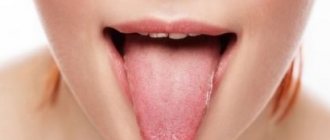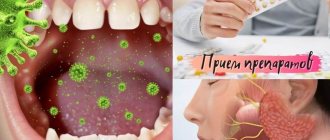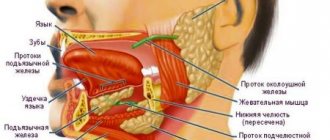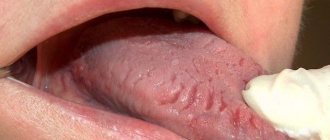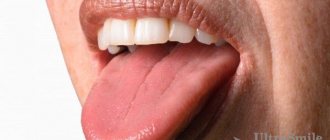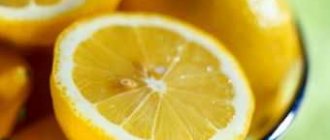Diseases of the gastrointestinal tract have a complex effect on the health of the entire digestive system, which includes the oral cavity. First of all, this effect is due to a lack of vitamins and minerals, which leads to inflammatory processes, and in addition, aggravates existing oral diseases.
Of course, in such cases, treatment of the problem should be comprehensive - you should also contact a dentist
, who will eliminate the manifestations of diseases in the mouth, and to an endocrinologist, who will directly eliminate the root of the disease.
Let's look at the main examples of gastrointestinal diseases that directly affect the condition of the oral cavity and teeth.
Types of gastritis
The largest division of gastritis is acute and chronic. The first occurs immediately after irritating factors come into contact with the gastric mucosa. In case of improper nutrition, it manifests itself in a catarrhal form, in case of poisoning or infection - in a fibrinous form.
Chronic is often caused by the bacterium Helicobacter pylori. The disease is characterized by a sluggish course with periodic exacerbations. Based on the localization of the inflammatory process, the following forms are distinguished:
- antrum - in the lower part of the stomach;
- fundal - in the middle section (sometimes extends to the bottom of the organ);
- reflux gastritis - in the area of the pylorus of the stomach.
The chronic type of the disease is characterized by dysfunction of gastric secretion. Its excessive activity causes increased acidity (this form is called hyperacid). With secretory insufficiency, acidity is reduced (this form is called anacid).
Forms and stages of gastritis
Inflammatory processes in the mucous tissues of the stomach develop gradually. In the initial stages, gastritis can be practically asymptomatic. But sooner or later the disease makes itself felt and becomes acute.
Acute gastritis is characterized by a sharp deterioration in health, the appearance of acute pain and heaviness in the stomach. Often, an exacerbation can be triggered by some irritant, for example, after taking medications, spicy food, alcohol, etc.
If acute gastritis is not treated in time, the disease may progress to the next stage. Chronic gastritis develops in 85% of cases. Periods of remission are followed by exacerbations of the disease, which in the future can lead to such serious consequences as gastric ulcers or even oncology.
Types of damage to the mucous membrane
Gastritis can also be classified according to the degree of change in the gastric mucosa. The mildest form is superficial, when the inflammatory process affects only the upper part of the mucosa. More dangerous forms include the following:
Although hyperplastic gastritis is characterized by the appearance of neoplasms, they are predominantly benign.
The atrophic form often leads to stomach cancer. Each of these types can be focal or diffuse: the first covers a small area of the mucous membrane (although there may be several of them), the second spreads over its entire surface.
Types of gastritis by etiology
The mucous membrane of the stomach can become inflamed for various reasons. Gastroenterologists, according to this criterion, divide diseases into several groups:
There are also mixed types. Thus, AC inflammation means that reflux is caused by autoimmune factors. It happens that autoimmune effects are combined with Helicobacter pylori infection. Then we are talking about AB gastritis.
Causes of acute gastritis
This disease appears suddenly. In rare cases, the cause may be the bacteria Helicobacter pylori entering the body. But usually it does not make itself felt instantly, but is the causative agent of sluggish chronic gastritis.
It is usually not difficult for an adult to determine the cause. It is enough to analyze what he ate and drank several hours before the attack. Inflammation can be caused by:
Infections can also cause an attack. Among the most likely, gastroenterologists identify cytomegaloverus, syphilis, and staphylococcus infection. People with weakened immune systems are more likely to become infected. Another reason for the development of an acute inflammatory process is exposure to bile. This only applies to type C gastritis.
Causes of gastritis
The main causes of gastritis are associated with the activation of aggressive processes in the body, which lead to a change in the acid-base environment in the stomach and the destruction of the protective epithelial layer of the stomach walls, which causes tissue inflammation.
Provoking factors for inflammatory and dystrophic changes in the gastric mucosa are stress, malnutrition, taking non-steroidal drugs (aspirin, analgin, diclofenac, ibuprofen) and the bacterium Helicobacter Pilory. The last factor is the most common cause of such diseases. “Helicobacter pylori” supports the inflammatory process in the stomach. A person can become infected with this bacterium in childhood and throughout his life. It multiplies in the body and gradually colonizes the mucous membrane. This process can take decades. If the bacteria is aggressive, it will eventually cause an inflammatory process.
Causes of development of chronic gastritis
The second most important cause of chronic inflammation of the gastric mucosa (after the bacterium Helicobacter pylori) is poor nutrition. This includes not only harmful products. Violation of the eating schedule is also detrimental to the stomach. Inflammation can result from:
The influence of other diseases (endocrine, metabolic, infectious, hypoxic) cannot be excluded. External factors (harmful working conditions, stress) also become causes of gastritis.
Prevention of gastritis
To prevent gastritis, you should adhere to a healthy lifestyle: stop smoking, do not abuse alcohol, avoid stress and engage in any type of physical activity. It is especially important to monitor your diet. It must be complete and balanced. Try to include less junk food in your diet, do not skip meals, make sure that your body fully receives the necessary substances: proteins, fats, carbohydrates, minerals, micro- and macroelements, vitamins.
You can make an appointment with a gastroenterologist at the Naedine Clinic by phone in Kirov: (8332) 32-7777 or through the form on the website
General signs of gastritis
Regardless of the type (acute or chronic), it always manifests itself as pain in the epigastric region (only its nature differs). Pain appears after eating or, conversely, from hunger. Other symptoms from the digestive system are possible:
Symptoms in adults are more severe than in children. In children, attacks are often accompanied by weakness, fever, and bruises under the eyes. Parents may confuse the first signs of gastritis with poisoning.
Another noticeable symptom of many types of this disease is a white (less often yellow) coating on the tongue. It is not cleaned during normal hygiene procedures. In most cases, plaque indicates a decrease in acidity.
Stomach ulcer
The symptoms of the disease and its nature are generally similar to the symptoms of gastritis, but its manifestations are more striking and persistent. Standard gastrointestinal pathologies can develop into a gastric ulcer due to increased stress, frequent and unnecessary medications, alcohol and tobacco abuse, or genetic predisposition.
Dental symptoms - swelling of the tongue, plaque on the oral mucosa, enlargement and increased sensitivity of the papillae of the tongue, increased temperature in the mouth, gingivitis and stomatitis
.
Treatment:
similar to the treatment of chronic gastritis or gastroduodenitis.
How to treat the disease
Since there are many types of gastritis, and each of them has its own causes, you cannot limit yourself to one treatment method. To combat each provoking factor, appropriate drugs are needed.
The doctor must determine by characteristic signs whether the patient’s acidity is increased or decreased. Depending on this, a suitable treatment regimen is selected.
Treatment of gastritis is usually complex, it is carried out in the following areas:
If the bacterium Helicobacter pylori is detected, it is important to eradicate it (complete destruction) with antibiotics. This is necessary to eliminate ulcerations, accelerate their healing and prevent the development of peptic ulcers and stomach cancer.
Causes
If we exclude everyday causes associated with mechanical damage to the mucous membrane of the tongue, swelling is almost always a symptom of other diseases. Therefore, you cannot delay visiting a doctor. The most common reasons are:
- Allergic reaction. Swelling can be caused by taking medications or foods that cause allergies. Typically, patients prone to allergies are aware of their problem. If you suspect allergic edema, you should consult a doctor. A severe allergic reaction can cause angioedema or angioedema. This condition develops rapidly, quickly spreading to the lips, cheeks, and larynx. The patient finds it difficult to breathe. In the most severe cases, angioedema can be fatal.
- Mononucleosis. A disease characterized by inflammation of the throat. Swelling of the tongue with mononucleosis is one of the accompanying symptoms.
- Diseases of the gastrointestinal tract. Edema develops against the background of colitis, enterocolitis, peptic ulcer, gastritis and other diseases. This reason is one of the most common.
- Hormonal disorders. For many diseases associated with hormonal imbalances, a swollen tongue is one of the symptoms.
Swelling of the tongue is not always a symptom of other diseases. Swelling often appears for everyday reasons:
- Bite.
- Burn.
- Mechanical damage (dentures, braces, poor-quality fillings, piercings, etc.).
How is acidity level determined?
The main acid found in the stomach and determining its acidity level is hydrochloric acid. It is produced by parietal cells. The alkaline components of gastric juice neutralize hydrochloric acid. They are produced by accessory cells of the mucosa. The two substances interact and the acidity level changes throughout the day.
You can find out its level using intragastric pH-metry. To do this, a thin probe with a measuring electrode is placed into the patient's stomach. It gradually moves deeper and shows the pH in different areas of the organ.
In the part of the stomach where acid is produced, in an adult patient the pH should be from 1.6 to 2.0, and in the zone of alkali production and acid quenching - up to 5.2.
The doctor also pays attention to the symptoms. With high acidity, the patient suffers from heartburn, belching and a burning sensation in the throat; with low acidity, the patient suffers from bloating, flatulence and bad breath.
Treatment of acidity disorders
If there are signs of low acidity, replacement therapy with enzyme preparations is prescribed. Its main task is to normalize the production of pepsin. Preparations containing acedin-pepsin help with this. Drug stimulation of gastric juice secretion is also necessary.
If the diagnostic results reveal increased acidity, the patient is prescribed antacids. They neutralize acid, weaken the activity of pepsin, and in some cases have an enveloping effect. To eliminate symptoms, medications are recommended that stimulate gastrointestinal motility and relieve spasms of smooth muscles. Additionally, you can use folk remedies - herbs, flax seeds, potato juice.
Why are gastroprotectors needed?
To prevent complications such as peptic ulcers and malignant tumors, it is important to keep the structure of the mucous membrane intact. Gastroprotectors are used for these purposes:
They should be taken when signs of gastritis appear. The doctor will determine which medications will fit into the selected treatment package. For prevention purposes, you do not need to drink them.
The stomach contains natural gastroprotectors - prostaglandins. They stimulate the formation of mucus, improve microcirculation and protect cells from destruction. If they are not produced enough, the gastroenterologist may prescribe their synthetic analogues. If the patient is being treated with non-steroidal anti-inflammatory drugs, drugs with prostaglandins prevent ulcerative lesions of the mucous membrane.
Preventive measures
Since gastritis is now diagnosed not only in adults, but also in children, prevention should begin as early as possible. First of all, you should normalize your diet:
When the first symptoms of inflammation of the gastric mucosa appear, it is important to minimize (or better yet eliminate) the consumption of chocolate, coffee, spicy and fried foods.
Gastroenterologists recommend regularly checking for parasitic infestations. When they are detected, it is important to carry out timely treatment, because they often attack the digestive system.
How to clean your tongue
If you don't have any health problems that affect the plaque, just follow these guidelines and remember to brush until all the plaque is removed and your tongue is pink again. Typically, tongue hygiene takes only 20–30 seconds.
Recommendations for adults
- Proceed with the procedure only after brushing your teeth
and rinsing your mouth. - Use special tools
: scrapers, nozzles and others. - Clean your tongue using sweeping movements
and light pressure. - Start from the root of the tongue
and end with the tip. - Do not brush your tongue with cross movements and do not press
too hard - this can damage it. - Don't forget to clean the instrument
after the procedure. - Be sure to rinse your mouth
with water.
Should children have their tongues cleaned?
Children also need tongue care, but not earlier than 3–4 years.
For younger children, tongue cleaning is pointless. They don’t eat junk food, especially not in the same quantities as adults, and they don’t drink tea and coffee. Until 3–4 years of age, normal oral care is sufficient. From 3–4 to 8 years
This is how you should clean your tongue.
- Move from the root of the tongue to the tip
with smooth sweeping movements, with even weaker pressure than with adults. - Similarly, clean the sides
of the tongue and the inside of the cheeks. - Be sure to rinse your mouth
.
From the age of 8
you can already use scrapers.





